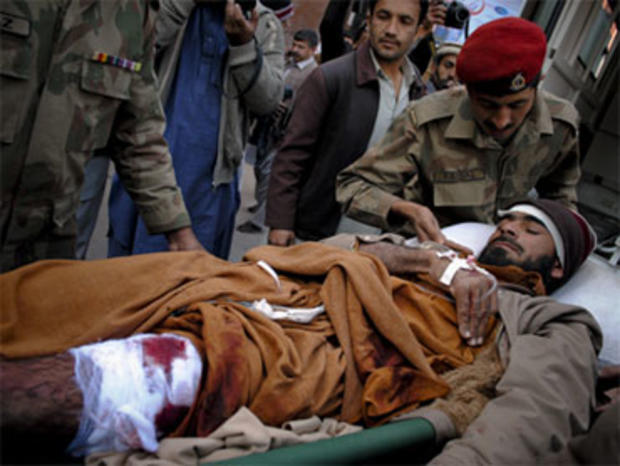After Attack, Pakistan Confronts Challenge of Burqa-Clad Bombers
ISLAMABAD - Pakistan's security officials on Sunday were reviewing security arrangements across the country to protect against an unexpected but growing challenge - the powerful reality of burqa-clad suicide bombers.
On Saturday, a suicide bomber wearing a burqa killed at least 45 people in an attack targeting a food distribution outlet in Pakistan's embattled tribal region, near the Afghan border.
For hours later, there was confusion over the gender of the attacker with some officials suspecting it to be the case of a man wearing the burqa, a head to toe veil, while others claimed that it was a woman.
On Sunday, a Pakistani security official in Islamabad said the attacker was finally established to be a woman, "but only after much discussion and debate." Speaking to CBS News on condition of anonymity, the official said "parts of the body have been pieced together to come to a conclusion".
The confirmation marks the first time that Islamic militants in the Afghanistan-Pakistan region are known to have sent a veiled woman to carry out a suicide attack.
Part of the confusion was caused due to recent attempts by men belonging to the Taliban or Al-Qaeda who were found to have attempted to carry out attacks while wearing a burqa - an apparent attempt to avoid closer scrutiny by the police and intelligence services, predominantly run by men across Pakistan.
The official who spoke to CBS News on Sunday specifically noted the recent case of a bearded man clad in a burqa, belonging to 'Lashkar-e-Jhangvi'-a militant group with ties to al Qaeda, who was arrested from the city of Lahore on December 17 "with explosives which he was carrying in a bag."
Pakistani investigators have concluded that the man arrested from Lahore was sent to attack a procession of 'Shia' Muslims who were out in large numbers of processions across Pakistan on that day, commemorating the 7th century death of Imam Hussain, prophet Muhammad's grandson, and 72 of his followers, who were massacred in Karbala, southern Iraq.
The Taliban and Al-Qaeda, known to be followers of the hardline wahabi 'Sunni' faith, which emerged from Saudi Arabia, are known to be strong opponents of Shia Muslims. The arrest on December 17 appears to have taken place unexpectedly when a policeman noticed what was only mentioned by the Pakistani official to CBS News as "very strange behavior" of the burqa clad militant.
The use of burqa in attempted suicide attacks has thrown up a rapidly growing challenge for Pakistan's security officials. Worn by Muslim women from highly conservative Islamic homes, the burqa, according to western officials, makes it additionally difficult for security forces to cope with this challenge.
A western ambassador in Islamabad who spoke to CBS News on condition of anonymity said on Sunday that "the threat of women wearing a burqa or men clad in burqa presents a major new challenge".
In contrast to attempts by some western countries to restrict the wearing of the burqa, Pakistan would face a storm of protests from hardline Muslims if it ever chose to even partially restrict the wearing of the burqa in light of security concerns.
"Any government in Pakistan will simply face a wave of protests if people believed that the burqa was being banned in some places" the western ambassador said.
The Pakistani security official who spoke to CBS News said that a shortage of equipment like reliable explosive detectors to scan people in crowded locations and a shortage of women trained to carry out duties of detecting explosives for Pakistani security forces presented further challenges.
"I have never come across a woman police dog-handler in this country. This example tells you something about an overall gap. We simply don't have enough women who are highly trained to carry out such jobs," the official said.
Analysts warned that Saturday's bombing illustrated a growing desperation by al Qaeda and its affiliates among the Taliban to adopt new tactics for targeting of different locations.
"The use of women, maybe children too, should not surprise anyone. This is where these people (militants) will employ all possible methods to make their presence felt," said Hasan Askari Rizvi, a respected Pakistani commentator on military and security affairs.
The western ambassador added that the U.S. and Pakistan had little gauge of the number of women trained by al Qaeda and the Taliban to be used as suicide bombers in the Afghanistan-Pakistan region.
"This is a big black hole in our knowledge. At best, there are rumors. We simply don't know how big is our enemy's capacity in this area," he said.
A Pakistani intelligence official also speaking on condition of anonymity from the northern city of Peshawar told CBS News he had seen warnings of militant groups considering tactics which include the use of women, children and even animals to carry out attacks.
"I am aware of reports of unusual methods in the pipeline. The use of women is just one," he said. "There have been reports of other methods in the pipeline such as sending of children armed with explosives. There have also been reports of plans to use carts filled with explosives and pulled by animals to target different important locations."
"I just hope Saturday's attack is not the first of many more of this kind to come. The challenge has just become so much bigger and more difficult," he said.
